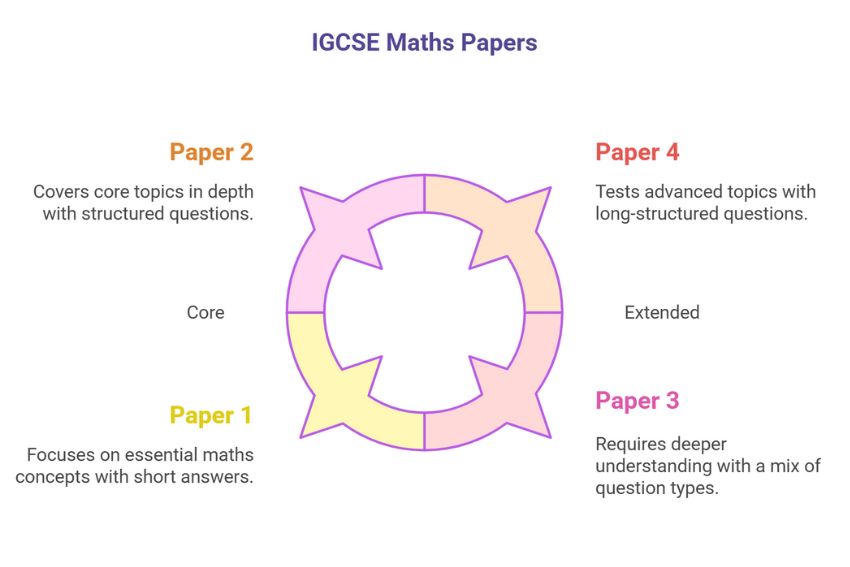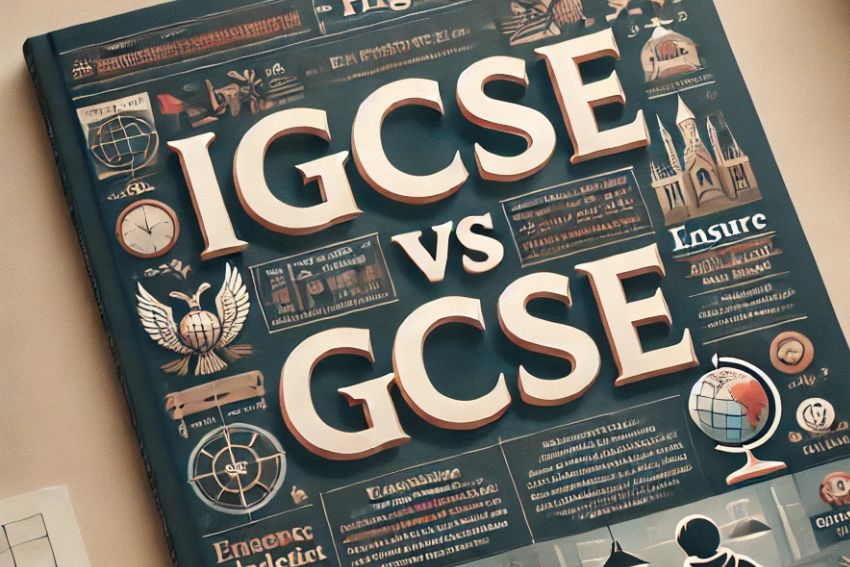As you are aware, IGCSE Maths is a globally renowned qualification approved for students between the ages of 14 and 16 and is generally accepted by colleges, universities, and other institutions all over. IGCSE Maths walks you through important topics like algebra, geometry, statistics, and number operations. It helps you build strong problem-solving skills and prepares students like you for further education, including A-Level Maths and STEM careers.
If you’re getting ready for IGCSE Maths, then our guide can help you understand the syllabus, exam structure, and most importantly, provide you with effective study strategies to do well in your IGCSE Maths exam. By following these steps, you’ll have a plan that will make preparation much easier.
Understanding the IGCSE Maths Syllabus
Now that we have a bit of information about why IGCSE is important and what it is, we need to explore further. First, if you want to start somewhere while preparing for IGCSE Maths, you should check its syllabus to get an idea of what you need to know. You can choose between two levels : Core and Extended, which depends on your academic goals.
IGCSE Maths Core Topics (For All Students)
The Core syllabus is best suited for you if you want to achieve grades C to G. It covers essential skills that are useful for everyday applications and further studies. Let’s take a look :
| Numbers | Fractions, decimals, percentages, ratios, and standard form. |
| Algebra | Simplifying expressions, solving equations, inequalities, and sequences. |
| Geometry | Angles, shapes, transformations, and coordinate geometry. |
| Statistics & Probability | Collecting data, interpreting graphs, calculating averages, and understanding probability. |
IGCSE Maths Extended Topics (For Higher Grades)
The Extended syllabus is for students aiming for grades A to C* (Edexcel IGCSE Maths syllabus). It includes all Core topics but introduces more advanced mathematical concepts to prepare you for A-Level Maths and beyond. For example :
| Advanced Algebra | Quadratic equations, simultaneous equations, and functions. |
| Trigonometry | Sine and cosine rules, 3D shapes, and real-world applications. |
| Calculus | Differentiation and basic integration (available in some exam boards). |
| Vectors & Matrices | Vector transformations and solving matrix equations. |
Whether you’re following the Core or Extended syllabus, mastering these topics is a must for exam success. Up next, we’ll explore the IGCSE Maths exam structure and how you can prepare effectively.
IGCSE Maths Exam Format
After understanding the IGCSE Maths syllabus, the next step is to understand the IGCSE Maths exam structure. Knowing the exam format helps you prepare better and focus on what matters the most. The exam consists of different papers, and the structure depends on whether you’re taking the Core or Extended syllabus.
Grading System
Like we already mentioned, IGCSE Maths grading system differs between the Core and Extended syllabuses: extended syllabus (Cambridge IGCSE Maths syllabus) grades range from A to E*, covering both basic and advanced concepts. As for core syllabus grades range from C to G. The questions focus on essential maths skills.
Students who take the Core syllabus cannot achieve grades A to B*, while those who take the Extended syllabus can achieve any grade between A and E*.
IGCSE Maths Paper Breakdown
Each exam board follows a similar format, meaning students complete two or three papers depending on their chosen syllabus. In these exams, the papers assess a range of skills, starting from basic calculations and progressing to complex problem-solving.

Some exam boards may also include alternative assessments, such as coursework or investigations, but written papers remain the primary assessment method. Understanding how the exams are structured and graded helps you plan your revision and focus better on your own strengths.
How to Revise for IGCSE Maths?
You might be wondering, what’s the next step? now, it’s time to focus on IGCSE Maths revision. A good revision plan can build your confidence and help you do well on your exam day. Let’s dive deeper into some details you need to know.
What’s The Best Way to Start my IGCSE Maths Revision?
Best and one of the important way for revision is using IGCSE Maths past papers. How it helps? it helps you get more familiar with the exam format and question types. Also, you can Identify common patterns and frequently tested topics. Lastly, it Improves your time management by practising under timed conditions and reduces your anxiety so you won’t get surprised on the exam. This strategy works well for all IGCSE subjects – many students find that regular practise with IGCSE Biology past papers or other science subjects helps them in the same way.
4 Easy Study Tips You Can Use
To retain information and sharpen your skills, use these simple tips:
1) Active Recall – Instead of just reading notes, test yourself regularly. Cover your notes and try to recall formulas, methods, and key concepts.
2) Problem-Solving Practice -Work through different types of questions, especially ones you find difficult. This strengthens your ability to apply concepts.
3) Spaced Repetition – Don’t cram everything at once. Instead, revise topics in intervals (e.g. revisit a topic every few days) to reinforce learning.
4) Mind Maps & Flashcards – Use visual tools to summarise formulas and concepts, making them easier to remember.

How Can I Manage My Time for IGCSE Maths Revision?
Balancing different topics is key to great revision. Here’s how you can stay on track:
- Simulate Exam Conditions – Practice with timed past papers to improve speed and accuracy.
- Start Early – Give yourself enough time to cover all topics without rushing.
- Use a Revision Schedule – Plan your study sessions, dedicating more time to challenging topics.
- Mix Up Topics – Avoid studying similar topics back-to-back. Switch between algebra, geometry, and statistics to keep your brain engaged.
Where to Find IGCSE Maths Past Papers?
To access official IGCSE Maths past papers, check: Cambridge International and Edexcel websites, they provide free past papers and mark schemes. Also, many schools have past papers available for students.
If you follow these steps, we’re sure that your preparation will be much more easier!
IGCSE Maths Challenging Questions
After going through past papers and revision tips, let’s take a look at some challenging questions you might encounter. Here are three challenging IGCSE Maths questions with clear solutions. These cover algebra, geometry, and probability, which are key areas in the exam.
1. Algebra – Solving a Quadratic Equation
Question: Solve for X
Solution: This quadratic equation can be solved by factorising.
Setting each factor to zero:
Final Answer: x = 2, x = 3
2. Geometry – Finding an Angle Using the Circle Theorems
Question: In a circle, the angle at the centre is twice the angle at the circumference. If the angle at the circumference is 38°, find the angle at the centre.
Solution: Using the circle theorem
Final Answer: 76°
3. Probability – Independent Events
Question: A bag contains 3 red, 5 blue, and 4 green balls. One ball is taken, replaced, then another is taken. Find the probability that both balls are blue.
Solution: Total number of balls = 3+5+4=12
Probability of picking a blue ball:
Since the ball is replaced, the probability remains the same for the second pick:
Maybe, now you have a bit of a clear idea how the challenging questions look like in IGCSE Maths.
Is IGCSE Maths hard?
Many students wonder whether IGCSE Maths is difficult. The difficulty level depends on individual strengths, study habits, and preparation. Some find it challenging due to its broad syllabus, problem-solving focus, and exam pressure. However, with the right approach, it is manageable.
Is IGCSE Harder Than GCSE Maths?
This is a common question among students. While both qualifications cover similar topics, there are some differences:
Content Depth: IGCSE Maths often includes more problem-solving and application-based questions, especially in the Extended syllabus.
Exam Structure: IGCSE does not have coursework, meaning students rely entirely on their exam performance. GCSEs previously had coursework, but now they are mostly exam-based too.
Grading System: GCSE Maths uses a 9-1 grading scale, while IGCSE may still use A-G grades* in some cases, depending on the exam board. The full IGCSE vs GCSE comparison can help you understand these differences in more detail.
Overall, IGCSE Maths isn’t always harder than GCSE, but it needs good problem-solving and analytical skills. With regular revision, past paper practice, and a clear understanding of the syllabus, students can do well in both.
IGCSE Maths Exam Day
After all the preparation, the big day has arrived. To perform at your best, it’s important to have a clear plan both before and during the exam. Here are some tips to help you stay calm, focused, and confident.
| Day Before the Exam | During the Exam |
| Get a full night’s sleep to stay focused. | Read all instructions carefully before starting. |
| Revise key formulas and concepts, but don’t cram. | Begin with easier questions to gain confidence. |
| Organise everything you need (pens, pencils, calculator, ID, etc.) | Manage time wisely-don’t spend too long on one question. |
| Eat a healthy meal and stay hydrated. | Show all workings for calculation-based questions. |
| Stay positive and avoid unnecessary stress. | Review answers if time allows, especially in multiple-choice and numerical questions. |
By following these, you’ll improve your chances of doing well in your IGCSE Maths exam. Now that you know how to handle exam day, let’s wrap up with some final thoughts.
Conclusion
In the end, preparing for IGCSE Maths might seem tough, but with the right approach, you can feel confident and ready. Understanding the syllabus, practising with past papers, and using smart revision techniques will help you to do well in the exam.
As the exam gets closer, focus on managing your time, staying consistent with your revision, and avoiding common mistakes. Additionally, online tutoring for IGCSE Math can be a fantastic option to get individualized help and make tricky topics easier to understand. With good preparation and a positive mindset, you can do this! Continue your practice, maintain your concentration, and approach the test with assurance. Good luck!
FAQ’s
What is the hardest topic in math IGCSE?
The hardest topic in IGCSE Maths often depends on the student, but many find trigonometry, calculus, and algebraic manipulation particularly challenging.
How to get an A* in IGCSE?
To score an A* in IGCSE Maths, you need a strong grasp of the syllabus, consistent practice, and support when necessary.
Is IGCSE only for UK?
No, IGCSE is not just for the UK. While it follows a British curriculum, it is offered in over 150 countries, making it a popular choice for international students.
Is IGCSE accepted in UK universities?
Yes, IGCSE is accepted by UK universities. It holds the same value as GCSEs and meets entry requirements for A-Levels, IB, and university applications.








